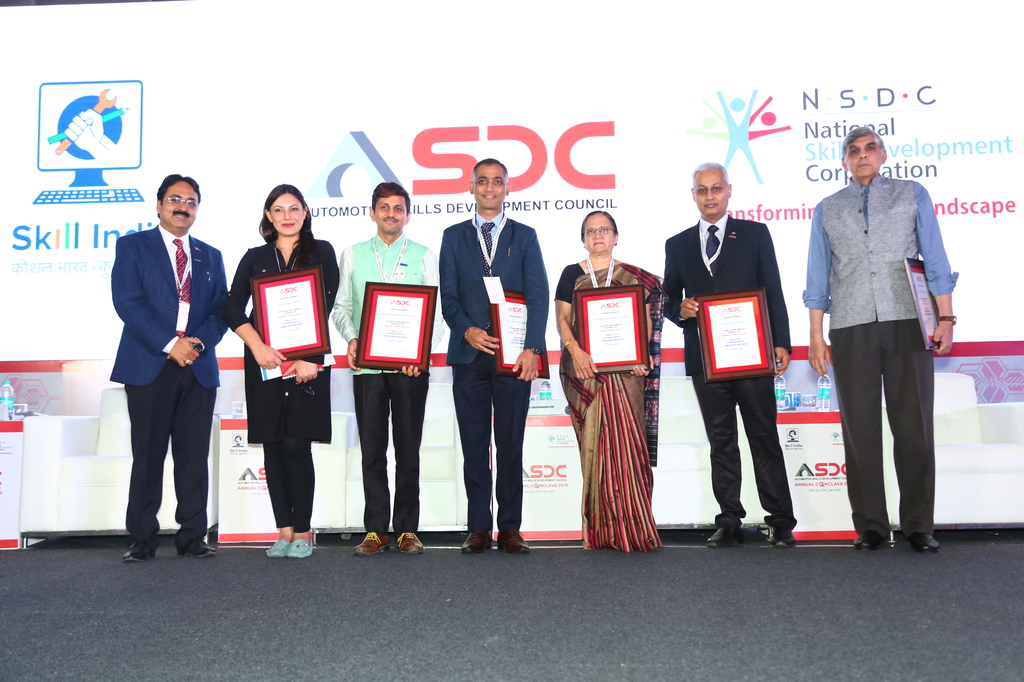Does the state have a role to play in mobilizing the candidates for skill based courses? Why do we need to mobilize and pull them towards these courses, what works and what doesn’t? Apparently, skilling is yet to become aspirational. How do we create aspirational value for skills vis-a-vis mainstream education and degree courses? How do we bring changes at the systemic level and influence the mindset of youth? What about skilling in the automotive sector that has a considerable number of MSMEs and unorganized workforce? Issues such as these were deliberated in a session moderated by Mr Arun Malhotra, Former MD, Nissan India at the ASDC Annual Conclave 2019. Let’s go through the perspectives and insights shared by the panelists representing different organizations.
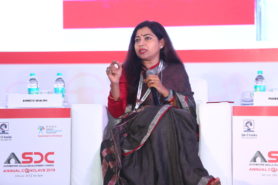 “The challenge to make skills aspirational. People don’t want to take up manual jobs. This has to do with how we have defined a skill by limiting it to manual and difficult tasks. People working in AC environment also need skills, managers also need skills. The definition is as skewed as we’ve defined a startup. We don’t consider MSMEs as startups. In the rural areas many people don’t want to migrate and work hard when they have an option to get freebies. Most degrees don’t land us in a profession and vocational training is not aspirational because hands-on work is highly de-valued, it needs to be given importance. We need to look at countries like Germany and learn how their ecosystems have evolved through product development and innovation, powered by skills. Ms. Shweta Shalini, ED,Village Social Transformation Foundation, Maharashtra
“The challenge to make skills aspirational. People don’t want to take up manual jobs. This has to do with how we have defined a skill by limiting it to manual and difficult tasks. People working in AC environment also need skills, managers also need skills. The definition is as skewed as we’ve defined a startup. We don’t consider MSMEs as startups. In the rural areas many people don’t want to migrate and work hard when they have an option to get freebies. Most degrees don’t land us in a profession and vocational training is not aspirational because hands-on work is highly de-valued, it needs to be given importance. We need to look at countries like Germany and learn how their ecosystems have evolved through product development and innovation, powered by skills. Ms. Shweta Shalini, ED,Village Social Transformation Foundation, Maharashtra
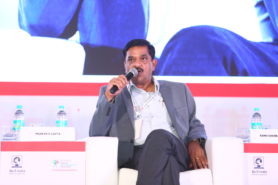 “Many students don’t know their career paths after vocational programs. We need to have a clear system that shows higher education path. This can demonstrate how technical training can be combined with higher education and how it can lead to higher qualification. On the rural front, we are unable to mobilise the students even after offering free-of-cost training and stipend. This is mainly because hands-on training is not aspirational and it does not have a pull factor. It’s a major challenge to have a proper communication strategy, particularly in the rural areas, where we can positively impact the underprivileged rural students, by partnering the government. .Mr. Mukesh K Gupta, Executive VP, Maruti Suzuki, India
“Many students don’t know their career paths after vocational programs. We need to have a clear system that shows higher education path. This can demonstrate how technical training can be combined with higher education and how it can lead to higher qualification. On the rural front, we are unable to mobilise the students even after offering free-of-cost training and stipend. This is mainly because hands-on training is not aspirational and it does not have a pull factor. It’s a major challenge to have a proper communication strategy, particularly in the rural areas, where we can positively impact the underprivileged rural students, by partnering the government. .Mr. Mukesh K Gupta, Executive VP, Maruti Suzuki, India
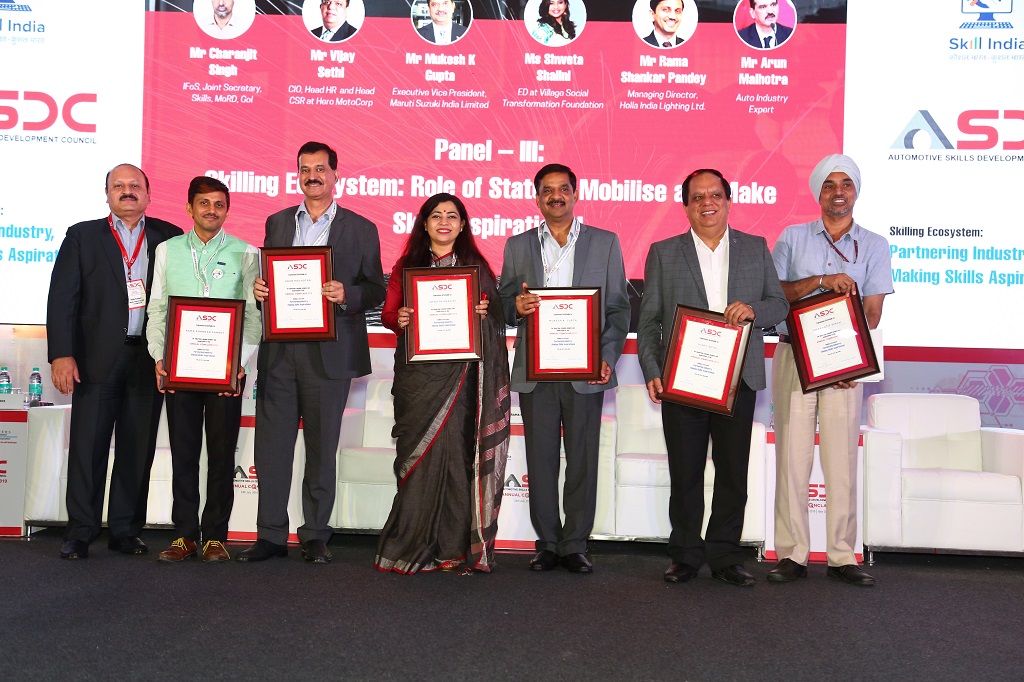
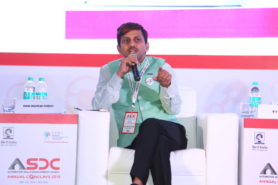 “We are not proud of our skills, we are obsessed with degrees and designations. People know each other because of their business cards and not because of skills. Our country has had a rich past that respected capability and hands-on work. This tradition is lost and in the process we’ve degraded practical work that enables livelihoods and sustains the rural economy. If we create demand for right skills, everything will fall in line. Each one of us has to play a role here and as a society we need to ensure that the momentum for skilling is continuously built.” – Mr. Rama Shankar Pandey, MD Hella India
“We are not proud of our skills, we are obsessed with degrees and designations. People know each other because of their business cards and not because of skills. Our country has had a rich past that respected capability and hands-on work. This tradition is lost and in the process we’ve degraded practical work that enables livelihoods and sustains the rural economy. If we create demand for right skills, everything will fall in line. Each one of us has to play a role here and as a society we need to ensure that the momentum for skilling is continuously built.” – Mr. Rama Shankar Pandey, MD Hella India
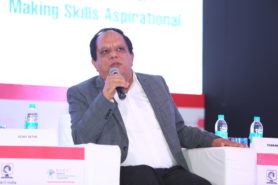 “Manually skilled people are not valued but are we paying them well? Are we skilling for tomorrow’s jobs? It has to be just-in-time skilling. To do it at scale it’s an opportunity for the market, the most difficult part is to reskil and upskill because they are deeply entrenched in particular way of doing things, If you can’t change the middle management it is difficult to skill at the lower levels. Skilling has to be integrated with both at school level and higher education level, that’s how it will get into mainstream. We don’t really value skills in our country. We don’t value our carpenters and plumbers. They don’t get the kind of money others make. That is why skills are not aspirational” – Mr. Vijay Sethi CIO, Head HR, & Head CSR, Hero MotoCorp Ltd.
“Manually skilled people are not valued but are we paying them well? Are we skilling for tomorrow’s jobs? It has to be just-in-time skilling. To do it at scale it’s an opportunity for the market, the most difficult part is to reskil and upskill because they are deeply entrenched in particular way of doing things, If you can’t change the middle management it is difficult to skill at the lower levels. Skilling has to be integrated with both at school level and higher education level, that’s how it will get into mainstream. We don’t really value skills in our country. We don’t value our carpenters and plumbers. They don’t get the kind of money others make. That is why skills are not aspirational” – Mr. Vijay Sethi CIO, Head HR, & Head CSR, Hero MotoCorp Ltd.
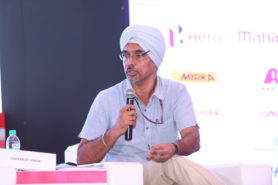 “After skilling when the youth get into jobs, they learn about other jobs and drop out hence there is lack of making an informed choice. For instance, in DDUGKY, they take up the jobs, more for sustenance though there is no aspiration. In villages and small towns, they live in a comfortable environment, they don’t like city and challenging life that needs lot of adjustments. The youth have to be made aware of this before getting into a job, post training. If you have to create an aspiration, you need to do a thought process change and also promote the path from skill to entrepreneurship. Most of the people from rural areas don’t know about the jobs and facilities. Awareness is the key to communication” – Mr. Charanjit Singh IAS, Jt. Secretary – Skills, Ministry of Rural Development
“After skilling when the youth get into jobs, they learn about other jobs and drop out hence there is lack of making an informed choice. For instance, in DDUGKY, they take up the jobs, more for sustenance though there is no aspiration. In villages and small towns, they live in a comfortable environment, they don’t like city and challenging life that needs lot of adjustments. The youth have to be made aware of this before getting into a job, post training. If you have to create an aspiration, you need to do a thought process change and also promote the path from skill to entrepreneurship. Most of the people from rural areas don’t know about the jobs and facilities. Awareness is the key to communication” – Mr. Charanjit Singh IAS, Jt. Secretary – Skills, Ministry of Rural Development




